Spruce "Lucky Strike": description, planting and reproduction
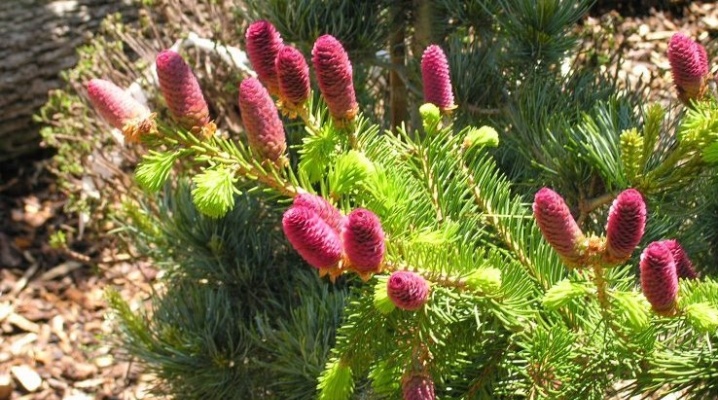
Decorative fir trees are considered the most original decoration of any landscape design. They are presented in various varieties, but Lucky Strike spruce deserves special attention. This plant has a non-classical crown shape and is easy to grow.
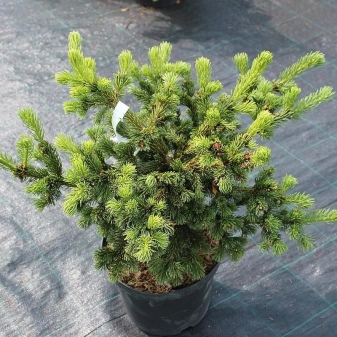
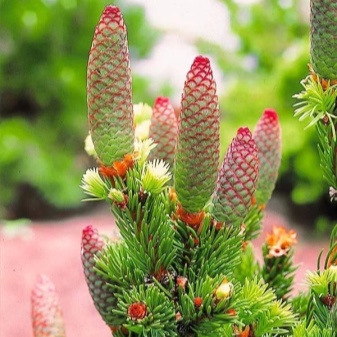
Peculiarities
Spruce "Lucky Strike" is an evergreen tree that belongs to the pine family. The main highlight of this variety is the original appearance of the crown - it has a disheveled, irregular shape. This feature is explained by the fact that the branches of the tree grow unevenly and some of them often outstrip the growth of their neighbors. Because of this, the spruce acquires an asymmetrical silhouette.
The height of the tree is small, it is considered undersized and rarely grows up to two meters. When the spruce reaches 10 years of age, the mark of its top does not exceed 120 cm, while the crown in diameter at this time can be 20-30 cm.
The spruce needles are prickly, plump and short. It is colored in a green-blue hue characteristic of this variety, but in the spring the tips of the needles often turn yellow-light green and light.
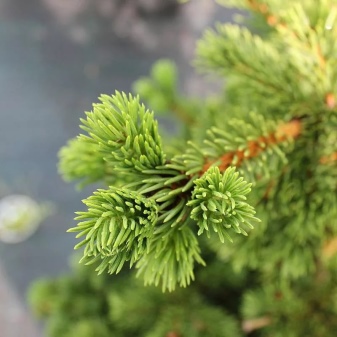
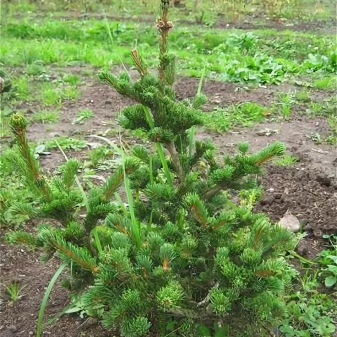
Cones play a huge role in the appearance of the Lucky Strike spruce. They are unusually large for such a tree, have a length of 10-15 cm. Young cones are colored purple or lilac-red, outwardly they resemble burning candles, due to this they give a special decorative effect to the plant. Over time, the buds change their color to dark brown. As a rule, there are many cones on the spruce, they remain on the branches until the next year.
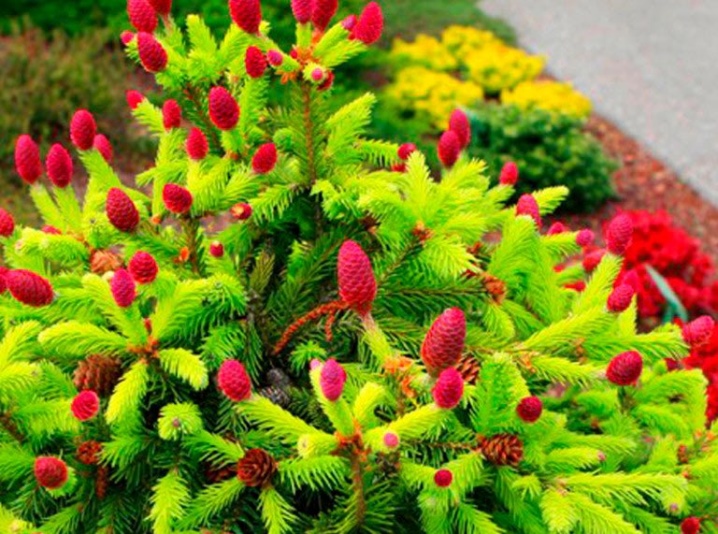
How to plant and care?
Before you start growing spruce of this variety at home, you should choose the right plot and land for it. The tree does not like clay soil, since its root system is located superficially. If the roots of the plant cannot penetrate into the depths of the soil, then during a drought it will die.
After the issue has been resolved with the choice of the site, you should start preparing the soil mixture for planting spruce. To do this, it is necessary to add high moor peat and sand to the excavated soil, if the soil is too poor, it is also mixed with leaf humus. It is advisable to prepare the planting hole and the garter stake 2 weeks before planting the tree.
In the case when it is planned to plant a spruce in a container, then the hole must be made twice deeper and wider than an earthen lump, the standard dimensions of which do not exceed 25-30 cm.
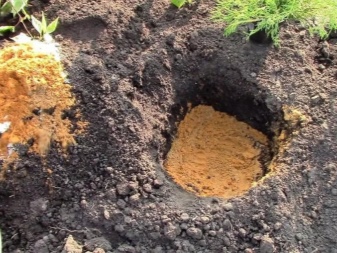
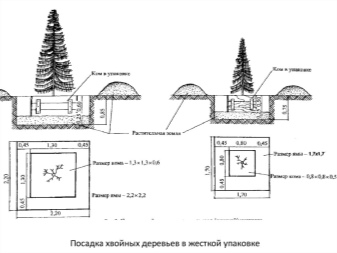
Where the spruce will be planted, moisture stagnation and soil compaction should not be allowed. To avoid this, it is best to select areas where groundwater runs deep. Additionally, you will also need to make a drainage layer of broken brick (up to 20 cm thick) and sand. When planting several trees, it is important to observe the distance between them, which should be up to three meters. In addition, it is important to pay attention to the fact that the root collar is at the level of the soil.
After planting the seedlings, abundant watering is performed (at least 50 liters of water is consumed per tree). Then, once a week, the spruce will have to be watered (10-12 liters per plant).
In order for the roots to receive air and nutrition, the soil should be loosened and a layer of peat (5-6 cm) should be covered around the trunk.
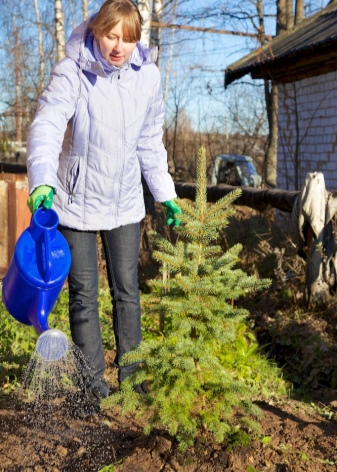
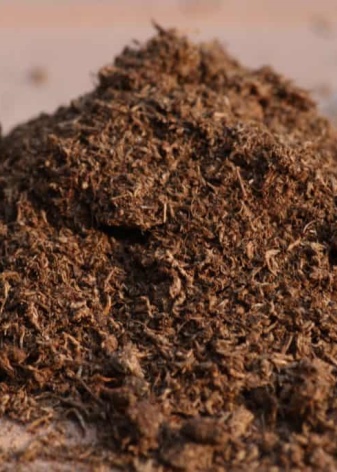
In order for the Lucky Strike spruce to quickly get used to the new planting site and begin to grow actively, it must be provided with proper care, which includes a number of activities.
- Spring top dressing using complex mineral fertilizers. Organic fertilizers cannot be applied to the soil, since the nitrogen included in their composition will stimulate the growth of tissues. This will damage the density of tissues, and the tree will decrease its winter hardiness. Top dressing is usually stopped when the spruce gives an increase of 20 cm or more.
- Fixing and lifting branches in the first years after planting. This is so that they do not break under the weight of snow in winter.
- Spruce protection from sunburn. It should be carried out in spring and winter, using thick fabric as a shelter.
- Formative and sanitary pruning. A similar procedure must be carried out when the tree reaches the age of 10 years. First of all, the damaged and dried branches are cut, then the young shoots are shortened. It is recommended to start pruning in June after the end of sap flow.
- Inspection of the tree to avoid the appearance of pests. If the needles begin to change their color, then this sign indicates the presence of a disease. In this case, it is necessary to remove the damaged branches and carry out a comprehensive treatment with fungicides.
- Preparation of spruce for wintering. To protect the tree from severe frosts, it must be covered with spruce branches.
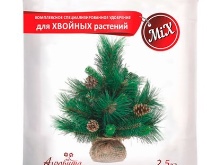
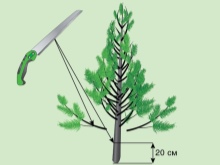
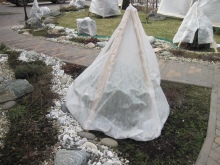
How to propagate?
Spruce "Lucky Strike" is usually propagated from seeds, but with this method there is a possibility that some of the trees will be varietal, and some will be ordinary. Therefore, after germination, it is necessary to reject the shoots.
Some gardeners use another interesting breeding method - from cones. According to the description of this method, in the spring, the cones are buried to a depth of 7 cm, and in the fall many shoots are formed from them.
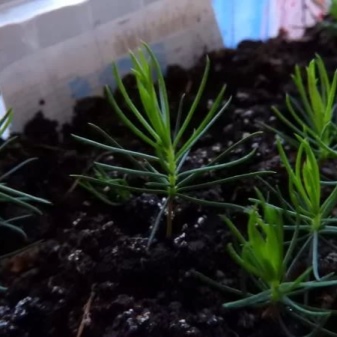
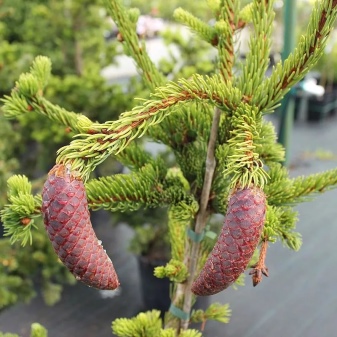
Use in landscape design
Spruce "Lucky Strike" is considered a versatile ornamental plant, since it can be planted in any place to decorate the territory. Such a spruce looks good in summer cottages, it can perform there not only a decorative function, but also act as a hedge. Thanks to such plantings, you can perform the original zoning of certain areas of the garden. Many owners of country houses plant trees along the street, next to the roadway.
In addition to evergreen beauties, it is recommended to plant single plants, placing them in flower beds. A tree bought in a pot will be interesting to decorate a terrace or street gazebos.
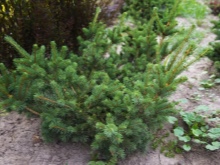
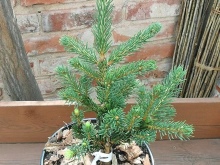
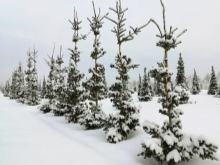
You will learn how to plant a Lucky Strike spruce from the video below.



































































The comment was sent successfully.